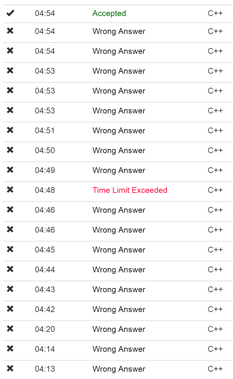Description
In ACM/ICPC contest, the ”Dirt Ratio” of a team is calculated in the following way. First let’s ignore all the problems the team didn’t pass, assume the team passed X problems during the contest, and submitted Y times for these problems, then the ”Dirt Ratio” is measured as X/Y. If the ”Dirt Ratio” of a team is too low, the team tends to cause more penalty, which is not a good performance.
Little Q is a coach, he is now staring at the submission list of a team. You can assume all the problems occurred in the list was solved by the team during the contest. Little Q calculated the team’s low ”Dirt Ratio”, felt very angry. He wants to have a talk with them. To make the problem more serious, he wants to choose a continuous subsequence of the list, and then calculate the ”Dirt Ratio” just based on that subsequence.
Please write a program to find such subsequence having the lowest ”Dirt Ratio”.
Input
The first line of the input contains an integer T(1≤T≤15), denoting the number of test cases.
In each test case, there is an integer n(1≤n≤60000) in the first line, denoting the length of the submission list.
In the next line, there are n positive integers a1,a2,…,an(1≤ai≤n), denoting the problem ID of each submission.
Output
For each test case, print a single line containing a floating number, denoting the lowest ”Dirt Ratio”. The answer must be printed with an absolute error not greater than 10^−4.
Sample Input
1
5
1 2 1 2 3
Sample Output
0.5000000000
题意
有一个长度为 $n$ 的序列,求所有区间 $[l,r]$ 的数字种类 / 区间长度 的最小值。
思路
二分答案 $mid$ ,检验是否存在一个区间满足 $\frac{size(l,r)}{r-l+1}<=mid$ 即 $size(l,r)+mid×l<=mid×(r+1)$ 线段树保存 $size(l,r)+mid×l$ ,然后我们可以枚举右端点 $r$ ,而在右端点加入时带来了自己的一份颜色,标记它上一次的出现位置,则 $r$ 对这段区间有贡献
AC 代码
#include <iostream>
#include <cstdio>
#include <cstring>
#include <algorithm>
using namespace std;
typedef __int64 LL;
const double eps = 1e-6;
const int maxn = 61000;
#define inf 0x3f3f3f
int last_appear[maxn];
int a[maxn],n;
double val[maxn << 2], laz[maxn << 2];
void pushUp(int rt)
{
val[rt] = min(val[rt << 1], val[rt << 1 | 1]);
}
void pushDown(int rt)
{
val[rt << 1] += laz[rt];
laz[rt << 1] += laz[rt];
val[rt << 1 | 1] += laz[rt];
laz[rt << 1 | 1] += laz[rt];
laz[rt] = 0;
}
void build(int l, int r, int rt, double v)
{
laz[rt] = 0;
if (l == r)
{
val[rt] = v * l;
return;
}
int mid = (l + r) >> 1;
build(l, mid, rt << 1, v);
build(mid + 1, r, rt << 1 | 1, v);
pushUp(rt);
}
void update(int L, int R, int v, int l, int r, int rt)
{
if (L <= l && r <= R)
{
val[rt] += v;
laz[rt] += v;
return;
}
if (laz[rt] != 0)
pushDown(rt);
int mid = (l + r) >> 1;
if (L <= mid)
update(L, R, v, l, mid, rt << 1);
if (mid < R)
update(L, R, v, mid + 1, r, rt << 1 | 1);
pushUp(rt);
}
double query(int L, int R, int l, int r, int rt)
{
if (L <= l && r <= R)
return val[rt];
if (laz[rt] != 0)
pushDown(rt);
int mid = (l + r) >> 1;
double ret = inf;
if (L <= mid)
ret = query(L, R, l, mid, rt << 1);
if (mid < R)
ret = min(ret, query(L, R, mid + 1, r, rt << 1 | 1));
return ret;
}
bool judge(double mid)
{
build(1, n, 1, mid);
memset(last_appear, 0, sizeof(last_appear)); // 该数字上一次的出现位置
for (int i = 1; i <= n; i++)
{
update(last_appear[a[i]] + 1, i, 1, 1, n, 1);
last_appear[a[i]] = i;
if (query(1, i, 1, n, 1) < mid * (i + 1))
return true;
}
return false;
}
int main()
{
int T;
cin >> T;
while (T--)
{
cin >> n;
for (int i = 1; i <= n; i++)
cin >> a[i];
double low = 0, high = 1, ans;
while (high - low > eps) // 二分答案
{
double mid = (low + high) / 2.0;
if (judge(mid))
high = (ans = mid) - eps;
else
low = mid + eps;
}
printf("%.9lf\n", ans);
}
return 0;
}



